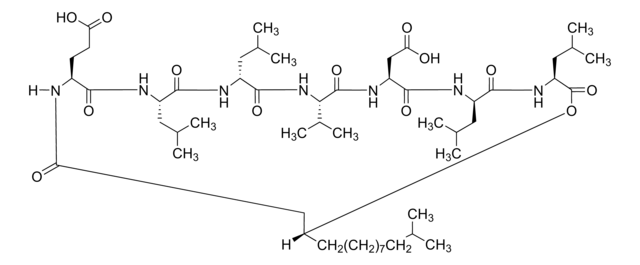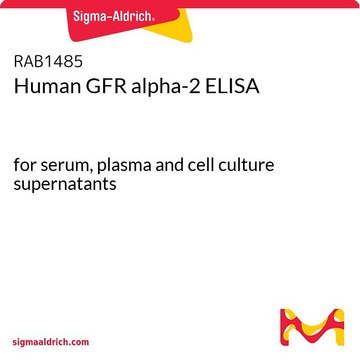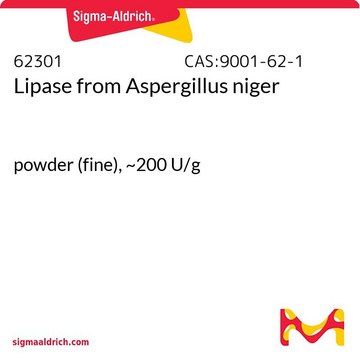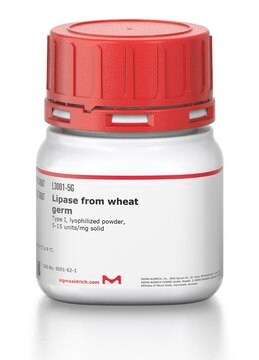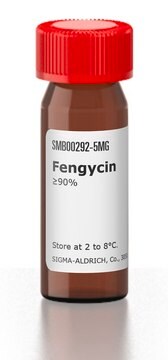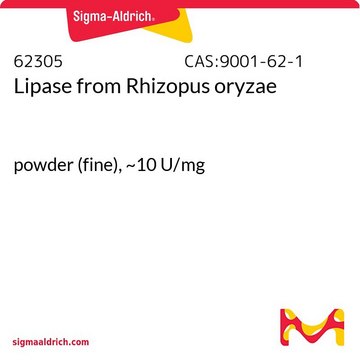68795
Hydrophobin SC3
≥98% (SDS-GE)
Autenticatiper visualizzare i prezzi riservati alla tua organizzazione & contrattuali
About This Item
Codice UNSPSC:
12352202
NACRES:
NA.61
Prodotti consigliati
Livello qualitativo
Saggio
≥98% (SDS-GE)
Stato
solid
N° accesso UniProt
Temperatura di conservazione
−20°C
Informazioni sul gene
Schizophyllum commune H4-8 ... SC3(9592530)
Descrizione generale
Hydrophobin SC3 is a class I hydrophobin of Schizophyllum commune. It is an oligomeric amphiphilic protein, rich in β-sheet. The mature protein consists of four disulfide bridges comprising eight cysteine residues. The N-terminal contains mannose residues in combination with threonine residues.
Applicazioni
Hydrophobin SC3 has been used to coat nitric oxide (NO) releasing medical-grade polymer to establish an antifouling layer to work synergistically with NO′s bactericidal and antiplatelet activity (SC3-NO).
Azioni biochim/fisiol
Hydrophobins are key regulators of fungal growth and development. The hydrophobin SC3 is known for its ability to assemble at the water and air, water and oil, and water and a hydrophobic solid interface. The self-assembling process subjects hydrophobin SC3 to many conformational changes. It permits the growth of aerial hyphae and fruiting bodies on fungi as a result of assembling at the water-air interface. Hydrophobin SC3 mediates the linking of cell wall glucans to chitin and helps in the hyphal cell wall formation. Hydrophobin SC3 might have antitumor actions and be useful in chemotherapy and radiation.
Altre note
Currently available only in Europe.
Codice della classe di stoccaggio
11 - Combustible Solids
Classe di pericolosità dell'acqua (WGK)
WGK 1
Punto d’infiammabilità (°F)
Not applicable
Punto d’infiammabilità (°C)
Not applicable
Dispositivi di protezione individuale
Eyeshields, Gloves, type N95 (US)
Scegli una delle versioni più recenti:
Possiedi già questo prodotto?
I documenti relativi ai prodotti acquistati recentemente sono disponibili nell’Archivio dei documenti.
X Wang et al.
Biophysical journal, 88(5), 3434-3443 (2005-03-08)
Hydrophobins are a class of small proteins that fulfill a wide spectrum of functions in fungal growth and development. They do so by self-assembling into an amphipathic membrane at hydrophilic-hydrophobic interfaces. The SC3 hydrophobin of Schizophyllum commune is the best-studied
Ryan Devine et al.
Biomaterials science, 7(8), 3438-3449 (2019-07-04)
In medical device design, there is a vital need for a coating that promotes treatment of the patient and simultaneously prevents fouling by biomacromolecules which in turn can progress to infections, thrombosis, and other device-related complications. In this work, hydrophobin
Eva Sahakian et al.
Journal of leukocyte biology, 102(2), 475-486 (2017-05-28)
Epigenetic changes in chromatin structure have been recently associated with the deregulated expression of critical genes in normal and malignant processes. HDAC11, the newest member of the HDAC family of enzymes, functions as a negative regulator of IL-10 expression in
K V Woan et al.
Molecular oncology, 9(7), 1447-1457 (2015-05-11)
The median survival for metastatic melanoma is in the realm of 8-16 months and there are few therapies that offer significant improvement in overall survival. One of the recent advances in cancer treatment focuses on epigenetic modifiers to alter the
Il team dei nostri ricercatori vanta grande esperienza in tutte le aree della ricerca quali Life Science, scienza dei materiali, sintesi chimica, cromatografia, discipline analitiche, ecc..
Contatta l'Assistenza Tecnica.